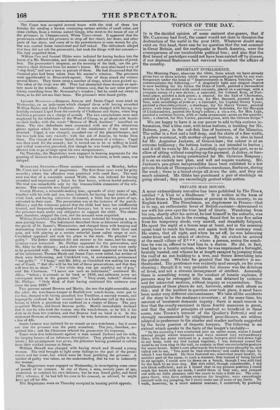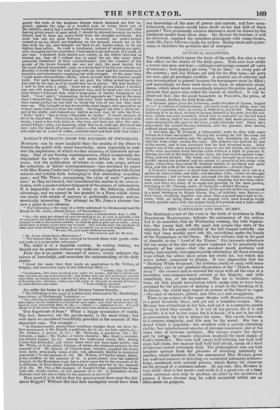PRIVATE MAD HOUSES.
A MOST extraordinary narrative has been published by The Timcg, i entitled " A Visit to a Madhouse." It is written in the form of a letter from a French gentleman at present in this country, to an English friend. The Frenchman, an Anglomane in France—that is to say, an enthusiastic lover of British customs—determined to see with his own eyes the true land of liberty. Wandering from his inn, shortly after his arrival, he lost himself in the suburbs, was misdirected, and, late in the evening, found that he was five miles from his temporary abode, very unwell, and dreadfully fatigued. He spent the night at a house near at hand, and in the morning again tried to reach his home, and again took the contrary road. He states, that all night, and when he set off, he was labouring under fever and an attack of cholera. By six o'clock he arrived at the small village of E* * * ; where a person, seeing the condi- tion he was in, offered to lead him to a doctor. He did, in fact, lead him to a lunatic asylum, where he was imprisoned a fortnight, brutally treated, and whence he at length escaped by jumping from the roof of an out-building to a tree, and thence aescending into the public road. We take for granted that the narrative is au- thenticated. The gentleman was evidently mad enough, on his own showing ; though it is very probable his disease was the delirium of fever, and not a chronic derangement of intellect. Assuredly there is something wrong in the conduct of lunatic asylums, if persons may be entrapped into them, and detained by violence and for interested motives, without inquiry or examination. The regulations of these places do not, however, admit such abuse as this ; and if the incident in question ever took place, it must have been under veryditferent circumstances. We take all the accidents of the story to be the madman's invention ; at the same time, his account of treatment demands inquiry : there is much reason to fear that the cruelty exercised in these fearful mansions is great, and that the milder principles of conduct so beneficial in these cases, (see TooxE's account of the Quaker's Retreat,) and so strongly recommended by enlightened practitioners, are seldom adopted in preference to the shorter and readier methods suggested by the brute passion of despotic keepers. The following is an extract which speaks to the facts of the keeper's brutality- " In the horning I was conducted into an under-room, where I found several people whose manners and ways seemed very extraordinary Here, with my arms enclosed in a coarse hempen shirt tied down tigh to my body, with my feet locked together, I was fastened round the waist to an iron ring in the wall, to remain in that uncomfortable posture for many hours. Some Lours afterwards the keeper came abruptly in, and called out to me, ' You must be tied elsewhere,' and undid the ropes by which I was fastened. He then fastened me, somewhat more loosely, in another part of the room, in such a manner, that instead of being forced to sit upright, I could now lie down on a bench, though I was still tied by the back to an iron ring. But this relief, though considerable, I did not think sufficient; and as I found that in my present position I could reach the knots with my teeth, I undid them in that way, and jumped out with no little pleasure into the court to take a little air. The com- pany there, who have seldom occasion for laughter, were exceedingly amused with my jumping, for I could make use of none of my limbs. To walk, however, in a more natural manner, I contrived, by pushing gently the ends of the leathern thongs which fastened my feet to- gether, against the edge of a wooden post, to bring them out of the buckles, and at last I undid the buckles themselves. I thought, that having given proofs of sane mind, I should be allowed to enjoy an entire liberty, and to have my arms freed from the straight-waistcoat. But such was not my good fortune. In a moment, an under-keeper rushed in on me, threw me headlong on the ground, struck me in the face with his fist, and brought me back to my former place, to tie me tighter than before. So rude a treatment, instead of making me quiet, only strengthened the resolution I had taken to.be delivered, if I could, at any rate. I declared, both plainly and calmly, to the fellow who had so treated me, that all I wished was to enjoy the air, like every other peaceable inhabitant of their establishment ; that the conduct of the people of the house towards me was not only the most horrid, but the most absurd imaginable ; and, in a word,that if he did not unloose me directly, I would take the wall along with me, fever and the resentment of injustice and inhumanity supplying me with strength. At the same time I made some extraordinary efforts, which showed that the timbers would yield. For such impertinence on my part, the fellow seized me by the hair and by the ears, as if he would tear me in pieces. My dear brother,' I said to him with a smile, treat me as rudely as you please, I neither can nor will resent it.' This disarmed him, and he went out ; nor was it long before I followed him, with a large piece of timber hanging to my back. Now,' said I, ' companion, do not approach me !' and at the same time I showed him, that though I had every limb confined, I had only to turn round quickly on one heel to break the ribs of any one who came near me. This brought atlast forward the head keeper, who proved in no respect more judicious than the other. He dragged me into a dirty cor- ner of the stable, and chained my feet to an iron ring let into the floor. ' Well,' said I, this is from Charybdis to Scylla' Jr. tornbe toujours de .11( -e en chaud mul. Perceiving, however, that the place was floored with bricks, I gave a few rude kicks to the ring, and then ran after the asto- nished keeper ; who, not knowing what else to do with me, delivered me over into the hands of a man of colour,—the stable-keeper, it seems,— who laid me in a sort of coffin, confined hand and foot with iron locks."



















 Previous page
Previous page